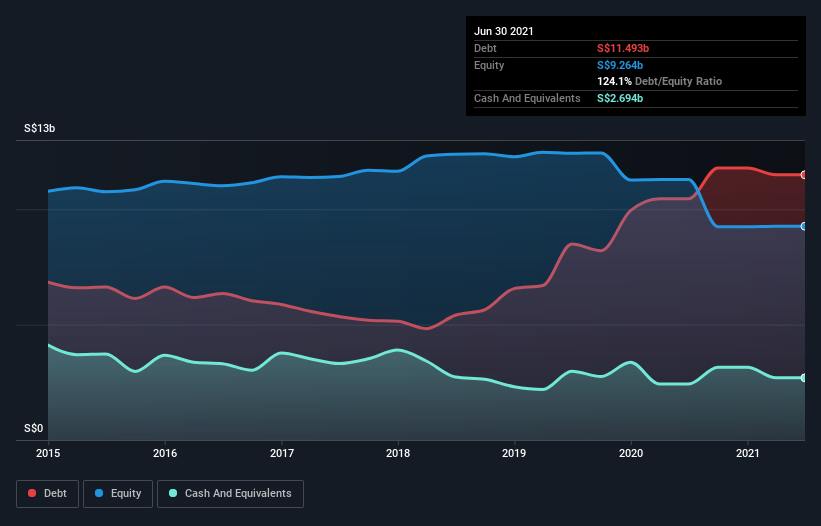
Warren Buffett famously said, 'Volatility is far from synonymous with risk.' When we think about how risky a company is, we always like to look at its use of debt, since debt overload can lead to ruin. We note that City Developments Limited (SGX:C09) does have debt on its balance sheet. But is this debt a concern to shareholders?
When Is Debt A Problem?
Generally speaking, debt only becomes a real problem when a company can't easily pay it off, either by raising capital or with its own cash flow. Part and parcel of capitalism is the process of 'creative destruction' where failed businesses are mercilessly liquidated by their bankers. While that is not too common, we often do see indebted companies permanently diluting shareholders because lenders force them to raise capital at a distressed price. Of course, debt can be an important tool in businesses, particularly capital heavy businesses. The first step when considering a company's debt levels is to consider its cash and debt together.
View our latest analysis for City Developments
What Is City Developments's Net Debt?
You can click the graphic below for the historical numbers, but it shows that as of June 2021 City Developments had S$11.5b of debt, an increase on S$10.5b, over one year. On the flip side, it has S$2.69b in cash leading to net debt of about S$8.80b.

How Strong Is City Developments' Balance Sheet?
We can see from the most recent balance sheet that City Developments had liabilities of S$6.91b falling due within a year, and liabilities of S$8.37b due beyond that. Offsetting these obligations, it had cash of S$2.69b as well as receivables valued at S$2.20b due within 12 months. So its liabilities total S$10.4b more than the combination of its cash and short-term receivables.
This deficit casts a shadow over the S$6.15b company, like a colossus towering over mere mortals. So we definitely think shareholders need to watch this one closely. At the end of the day, City Developments would probably need a major re-capitalization if its creditors were to demand repayment. The balance sheet is clearly the area to focus on when you are analysing debt. But ultimately the future profitability of the business will decide if City Developments can strengthen its balance sheet over time. So if you want to see what the professionals think, you might find this free report on analyst profit forecasts to be interesting.
In the last year City Developments had a loss before interest and tax, and actually shrunk its revenue by 23%, to S$2.2b. To be frank that doesn't bode well.
Caveat Emptor
Not only did City Developments's revenue slip over the last twelve months, but it also produced negative earnings before interest and tax (EBIT). To be specific the EBIT loss came in at S$282m. Considering that alongside the liabilities mentioned above make us nervous about the company. We'd want to see some strong near-term improvements before getting too interested in the stock. It's fair to say the loss of S$2.0b didn't encourage us either; we'd like to see a profit. In the meantime, we consider the stock to be risky. There's no doubt that we learn most about debt from the balance sheet. However, not all investment risk resides within the balance sheet - far from it. Case in point: We've spotted 2 warning signs for City Developments you should be aware of, and 1 of them can't be ignored.
If you're interested in investing in businesses that can grow profits without the burden of debt, then check out this free list of growing businesses that have net cash on the balance sheet.
New: AI Stock Screener & Alerts
Our new AI Stock Screener scans the market every day to uncover opportunities.
• Dividend Powerhouses (3%+ Yield)
• Undervalued Small Caps with Insider Buying
• High growth Tech and AI Companies
Or build your own from over 50 metrics.
Have feedback on this article? Concerned about the content? Get in touch with us directly. Alternatively, email editorial-team (at) simplywallst.com.
This article by Simply Wall St is general in nature. We provide commentary based on historical data and analyst forecasts only using an unbiased methodology and our articles are not intended to be financial advice. It does not constitute a recommendation to buy or sell any stock, and does not take account of your objectives, or your financial situation. We aim to bring you long-term focused analysis driven by fundamental data. Note that our analysis may not factor in the latest price-sensitive company announcements or qualitative material. Simply Wall St has no position in any stocks mentioned.
About SGX:C09
City Developments
City Developments Limited (CDL) is a leading global real estate company with a network spanning 168 locations in 29 countries and regions.
Reasonable growth potential and fair value.
Similar Companies
Market Insights
Community Narratives


